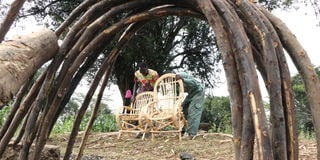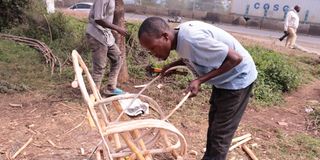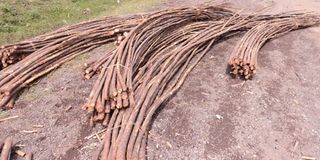Biz Lounge: Inside the profitable chair-making business at Sachangwan

Two young men polish chairs made from Cyprus branches at Sachangwan on August 21, 2024.
Making traditional chairs along the Nakuru-Eldoret highway is not too new to any of us.
I have always been curious though about how the craftsmen bend the small branches and make the chairs out of curved sticks.
While these chairs may have been traditionally associated with a rural, "under the tree" setting, they are now making a comeback in modern design.
The simple, organic look of this handcrafted furniture, made from cypress branches, is finding its way into contemporary homes, hotels, and offices as people seek to infuse their spaces with rustic charm and natural warmth.
Shadrack Yego, who learned the job through observation and a few months of hands-on experience, tells us how he’s managed to succeed over his seven-year stint in the business.

Shadrack Yego fixes a Cyprus branch into a chair at Sachangwan on August 21, 2024.
“After finishing my primary school education in 2011, I did menial jobs that I was barely earning from and decided to quit. After staying a while without a job, In April 2017, while I was walking along the Sachangwan stretch, I saw ‘wazees’ making chairs and enquired if I’d join them,” Yego recalls.
With no carpentry skills, he started by peeling the bark off branches. Three months into the job, Yego notes he had observed enough to start his own business.
With Sh. 600 in one hand and a machete (panga) in the other, Yego followed the waters to Koibatek forest, where they sourced their branches and have been doing that ever since.
“I started my business with only Sh. 600. Sh. 200 went to securing an operational permit to access the forest, and the other portion went into paying a rider to deliver the branches at my work spot,” he explains.
“When the wazees burnt their branches, so did I. When they curved them, I did. Everything I did from peeling to carpentry to pricing, was exactly how the others did. I owe part of my business success to them,” the 31-year-old says proudly.
His craftsmanship is one profitable venture as he manages to create five rustic chairs per day, each selling for 600 shillings. Additionally, he crafts matching tables on demand, which he sells for 1,200 shillings each.
“I can make up to Sh. 1,500 profit per day and the chairs are always a sure bet as clients frequently want them,” Yego says. “Most people now prefer these chairs to plastic ones because they're long-lasting and add an aesthetic appeal to many spaces.”
Now six years into self-employment, Yego boasts of having two permanent employees and providing an apprenticeship space for other youth to help them escape the ‘Kata hema’ job- this entails young people climbing up unsuspecting long vehicles with vinyl mats and cutting them to steal the transported goods for resell.
“We have a lot of young people here who, like me, stay idle in the hopes of getting a job. I have made sure to provide them with the opportunity to apprentice at my spot to keep them away from the ‘kata hema’ job this area’s young people are infamously known for. I want to teach them so that they can also start their businesses the same way I did,” he says.

Bundles of Cyprus tree branches used to make chairs along the Nakuru-Eldoret highway on August 21, 2024.
It’s a given that every business must have its fair share of challenges, and Yego’s is not different.
He notes that his biggest challenge has been when the seats get rained on and they rot due to his lack of a permanent structured workshop.
“There are seasons when business is slow, and this often means we get to stay with the seats longer such that when they get rained on, they start changing colour, which many clients do not like. When this happens, I usually let it be and take the seats home, which in turn calculates as a loss. Sometimes, I am forced to buy paint, which adds an extra expense to the business and is also not preferred by many customers,” he says.
While this process of chair making might seem tedious, Yego is confident in his ability to provide a sustainable business that neither harms the environment nor compromises on quality and hopes that a lot of people will use eco-friendly materials for a better planet.


